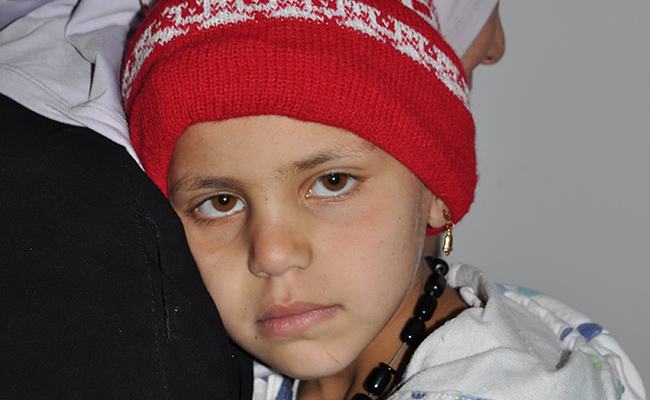
Syria’s Healthcare Collapse

Ibtisan sits on the floor surrounded by her five children. There is no furniture, just a few cushions scattered about. One girl stands out; she is wearing a bright red woolly hat. Her name is Tasinne and she is six years old. Despite having 8 month old baby twins to look after, Ibtisan is totally focused on Tasinne. She sits on her mother’s lap and cuddles in as close as she can get. Tasinne has cancer.
It wasn’t the shelling or bullets that made this mother leave Daraa (one of the areas worst affected by the conflict in Syria) but the fact that she couldn’t get any medicine for Tasinne.
Ibtisan told us: “We had been living in constant fear for a year and a half. We were staying in underground shelters and would only leave to get bread; we had to crawl along the streets because it was so dangerous. But when Tasinne started to get sick we took her to a doctor and they told us she had cancer of the kidney. I knew then that we would have to leave. There are no medical facilities available anymore”
Ibtisan had to leave her husband behind in Syria. He is trying to protect their home. The mother came to Amman, Jordan’s capital and is living in an apartment that she can’t afford. She is already two months behind on rent. Every penny she gets goes towards Tasinne’s medical care.
“The chemotherapy costs 200 JD (220 EUR) a session and I have been told she needs one session a week until July. CARE gave me money to pay for the last two sessions but I don’t know how I will pay for the next one. She had a session yesterday and is now suffering from the side effects. I want to take her to the doctor but that will cost more money – what can I do?”
When Tasinne is asked what she would like to be when she grows up she simply states: “a doctor so I can give out free medicine.”
What is CARE doing?
Women and children who have fled the violence without a male head of the household are particularly vulnerable and have particular needs for assistance. CARE is working to address those needs by ensuring that they have access to basic services, providing emergency cash to pay for food and accommodation and offering psychosocial support.
During the winter months we provided clothing, blankets, mattresses and heaters to families who had to flee with nothing and found themselves living in overcrowded, cold buildings where they had to sleep on the floor.
Households receiving refugees in Amman are themselves very poor and in need of support to cope with increased pressure on limited employment opportunities, basic services and essential commodities. CARE in Jordan therefore also supports poor Jordanian families with basic relief items such as blankets, bed sheets, and winter clothes for children and food.